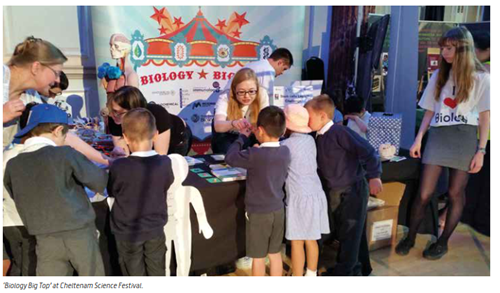Published: 23 Nov 2016
Category:
In October we celebrated the fifth annual Biology Week with life science celebrations happening all over the UK, including many biomedical events and activities.
The Learned Society Partnership on Antimicrobial Resistance (LeSPAR) of which the Royal Society of Biology (RSB) and the British Pharmacological Society are members, held a popular Policy Lates event on antimicrobial resistance (AMR). Participants examined the roles of innovation and regulation in tackling the AMR crisis from different perspectives, including veterinary research, biotechnology and public health.
This year we have also run several public engagement activities for a general audience, in partnership with British Pharmacological Society and our other Membership Organisations. In June the ‘Biology Big Top’ went to Cheltenham Science Festival and the Big Bang Fairs in Yorkshire and Humber, and in July we were at Lambeth Country Show. The British Pharmacological Society and RSB activities: ‘Medicine Makers’ and ‘The Hungry Games’ complemented each other alongside our other partners to engage people from all backgrounds in the breath of the life sciences.

The RSB is continuing to work closely with all our Member Organisations (MOs), individual members, committees and advisory groups to ensure we fully engage policy makers and politicians on the implications of Brexit for bioscience. Working closely with colleagues in the biomedical sciences, we are also seeking to amplify the shared messages from across science, as we have done for the Teaching Excellence Framework (TEF) consultation.
Soon in the new year we hope to start working with our MOs on the annual Voice of the Future event. At Voice of the Future, young scientists and engineers quiz key political figures in the Houses of Parliament about the science policy issues that matter to them. It is a unique event – in no other part of Parliament is the normal select committee format completely reversed so that MPs have to answer questions rather than ask them. The event aims to highlight the importance of policy makers using reliable evidence and being held to account on their decisions and today’s young scientists will bevital for this in the future. Last year the British Pharmacological Society’s Young Pharmacologists Advisory Group members asked the committee, including Science Minister Jo Johnson MP, questions such as: ‘Do you think business should offer greater incentives for young people to study STEM subjects at university to help fill the shortfall of skills in the science and engineering sectors?’ (See Vedia Can’s article in the June 2016 edition: ‘Representing Young pharmacologists at Voice of the Future’).
The Drug Discovery Pathways Group, or DDPG, is a partnership of learned societies that now includes RSB, but originally initiated by the British Pharmacological Society and the Royal Society of Chemistry (RSC), that has provided a single well-informed and representative voice on key issues associated with medicines research. The Group’s work has focussed on three main areas: industry-academia partnerships, knowledge and skills. The DDPG has actively sought to influence the policy environment and offer proactive proposals to support drug development. This has included a push to create better cross-sector exchange of information, people and knowledge through mechanisms such as a Drug Discovery Advisory Forum that could bring together medical charities, funding bodies, businesses, academics, the NHS and learned societies, to ensure patients’ needs are met in a sustainable and cost-effective manner, and that the UK remains at the forefront of medicines research. There has been significant movement in this direction over the last five years and the DDPG is now considering how best to evolve its own objectives.
For anyone interested in biology teaching at all levels, I would encourage you to take a look at our recently launched free online ‘virtual special issue’ of the Journal of Biological Education (JBE) to celebrate its 50th birthday and highlight some of the incredible research it has published.
Editor Professor Ian Kinchin CBiol FRSB put together the issue which includes 40 of some of the most cited and downloaded articles including: Learning difficulties in biology; The epidemiology of a zombie apocalypse; and Using role play to debate animal testing. These articles will be free to everyone until the end of 2016. The JBE is uniquely broad in its reach; it’s a really accessible journal for people who teach the biosciences across the spectrum. Looking to the next 50 years of the JBE, I’m excited to see more research into the interface between school and universities.
Comments
If you are a British Pharmacological Society member, please
sign in to post comments.